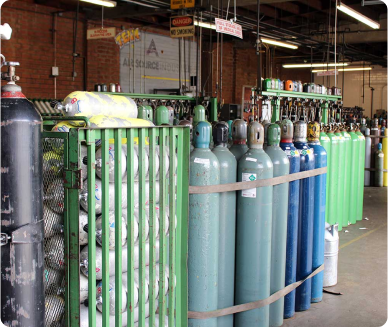Compressed Gas Cylinder Pricing Factors
Industry News
Compressed Gas Cylinders: How Composition Influences the Sale Price
Compressed gas cylinders are an essential part of several industries, ranging from healthcare and manufacturing to food processing and welding. However, the sale price of these cylinders varies significantly depending on their commercial makeup. The type of gas they contain, the material of the cylinder, and the size all play key roles in determining their market value.
Types of Gases and Their Impact on Price
The gas contained within a cylinder is the primary factor influencing its sale price. Common gases like oxygen, nitrogen, and carbon dioxide are generally cheaper because they are abundant and widely used across multiple industries. Conversely, specialty gases like acetylene, argon, helium, and medical-grade oxygen are typically more expensive due to their more specific uses, complex extraction processes, or scarcity.
For instance, helium, used in both medical and industrial applications, is costly because it is a non-renewable resource with limited extraction sources. Similarly, acetylene, widely used for welding and cutting, has higher costs due to the specialized production process involving calcium carbide.
Each supplier is different, and the cylinder costs do vary wildly between them. Especially as a number of suppliers try and bamboozle their customers by offering products in KG’s, cylinder sizes (Litres / S, M, L) and cubic meters (m3) at various pressures. At PCG, we maintain that as you are buying a gas, it’s always better to compare a m3 price – except CO2 and LPG which are measured in weight
The basic costs that make up a cylinder of gas:
– Energy costs makes up 80% of the cost to produce the actual gas. Which is why liquid gases are cheaper as it bypasses a number of the other costs associated with cylinder based gases.
– Operational costs – ASU’s and fillings plants are not cheap to build, run and maintain. Further, the filling and handling costs of the cylinders within strategic hubs plus additional works such as safety checks, cylinder registration, compliance and ISO standards adds to the cost.
– Profit for the company. This varies widely as some suppliers offer a really ‘cheap’ gas price only to charge a high rental costs to compensate.
– Distribution costs – both liquid gases to hubs to fill the cylinder and the transportation of full cylinders to various parts of the country to provide a local & national supply.
Cylinder Material and Durability
The material used to manufacture the cylinder significantly impacts its cost. Steel cylinders are generally more affordable but heavier, which can lead to increased transportation costs over time. Aluminium cylinders are lightweight, corrosion-resistant, and ideal for high-purity gases, but their production cost is higher, reflecting in their rental price.
In recent years, there has been an increased demand for composite cylinders made of materials like carbon fibre, which offer the benefits of being lightweight and highly durable. However, the sophisticated manufacturing process for these materials drives up the cost, particularly for industries requiring portability and resilience under extreme conditions. Such as BOC’s Genie™ cylinders
Regulatory Compliance and Safety Standards
Compressed gas cylinders must adhere to strict safety regulations, which can vary across different countries. Compliance with standards set by bodies like the Department of Transportation (DOT) or the International Organization for Standardization (ISO) involves rigorous testing and certification processes, adding to the production cost. Cylinders intended for hazardous or toxic gases require additional features like reinforced walls and specialized valves, further increasing their cost and retest price – which generally means an increase in your rental prices.
Market Dynamics and Supply Chain
The bigger the supplier with more ASU’s (Air separation Units) in operation the cheaper it is to produce liquid gases but due to their size, larger workforces, more complexity and extra layers of bureaucracy this further increasing their costs to fill cylinders. Conversely the smaller the suppliers (who don’t own any ASU’s) they can’t offer a liquid supply but can offer a more competitive price for their compressed gases as they have less overheads.
You can find out about how many ASU’s each supplier has in our supplier page.
Another crucial factor affecting the sale price is the supply chain, including factors like transportation, storage, and distribution to offer a nationwide service. As compressed gas cylinders are often shipped over long distances, fluctuating fuel costs, logistical hurdles, and supply chain inefficiencies can drive up the price, especially for gases with limited production regions like helium.
In turn makes the filling, handling and distribution costs for larger suppliers far higher than smaller gas suppliers outside the big three. Smaller suppliers typically work through an independent agent network and operate only in specific geographical areas to reduce their costs further. These so called ‘fighter brands’ exist so that excess costs can be mitigated somewhat as these are ‘independent’ companies, however the service, geographic coverage and at times product offering are limited to ensure a lower cost option is maintained without trashing the main brands.
Conclusion
The sale price of a compressed gas cylinder is a combination of multiple factors, with the commercial makeup of the cylinder playing a dominant role. The type of gas, material, size, and adherence to safety regulations all contribute to the final price, along with the broader forces of market demand and supply chain logistics. Businesses looking to purchase gas cylinders must consider these variables carefully to ensure they get the best value for their needs while balancing cost, safety, and performance.
PCG are uniquely placed to inform your business of these market forces and variables to ensure your business achieves the best price for your gases. Contact us today.
How Can We Help You?
Please contact us regarding our services for a tailored
discussion of your needs.

